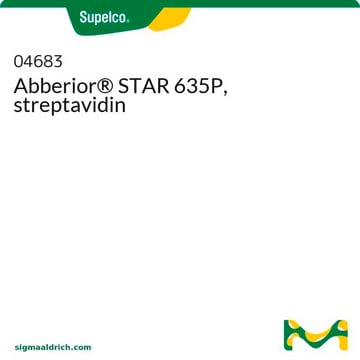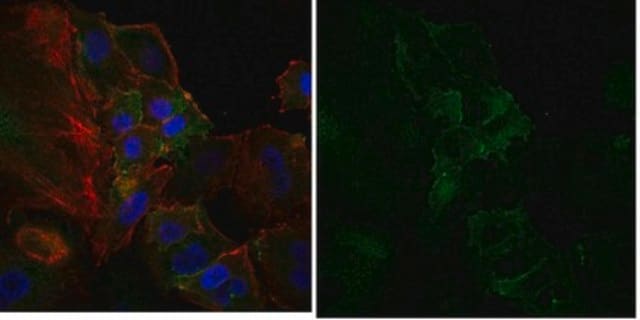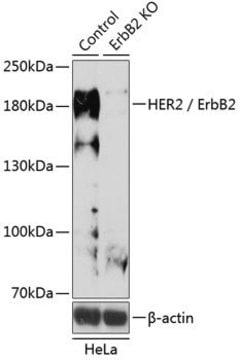30558
Abberior® STAR 635, NHS ester
for STED application
Sinónimos:
super-resolution Microscopy
Iniciar sesiónpara Ver la Fijación de precios por contrato y de la organización
About This Item
UNSPSC Code:
12352108
NACRES:
NA.32
Productos recomendados
Quality Level
concentration
≥50.0% (degree of coupling)
solubility
DMF: 0.25 mg/mL, clear
fluorescence
λex 635 nm; λem 655 nm±10 nm in PBS, pH 7.4
storage temp.
−20°C
General description
Absorption Maximum, λmax: 635 nm (PBS, pH 7.4)
Extinction Coefficient, ε(λmax): 110,000 M-1cm-1 (PBS, pH 7.4)
Correction Factor, CF260 = ε260/εmax: 0.26 (PBS, pH 7.4)
Correction Factor, CF280 = ε280/εmax: 0.38 (PBS, pH 7.4)
Fluorescence Maximum, λfl: 656 nm (aq. acetonitrile; MeOH)
655 nm (PBS, pH 7.4)
Recommended STED Wavelength, λSTED: 750 −780 nm
Fluorescence Quantum Yield, η: 0.88 (PBS, pH 7.4)
Fluorescence Lifetime, τ: 2.8 (PBS, pH 7.4)
Extinction Coefficient, ε(λmax): 110,000 M-1cm-1 (PBS, pH 7.4)
Correction Factor, CF260 = ε260/εmax: 0.26 (PBS, pH 7.4)
Correction Factor, CF280 = ε280/εmax: 0.38 (PBS, pH 7.4)
Fluorescence Maximum, λfl: 656 nm (aq. acetonitrile; MeOH)
655 nm (PBS, pH 7.4)
Recommended STED Wavelength, λSTED: 750 −780 nm
Fluorescence Quantum Yield, η: 0.88 (PBS, pH 7.4)
Fluorescence Lifetime, τ: 2.8 (PBS, pH 7.4)
Application
- Abberior® STAR 635 goat anti-rabbit antibody has been used for STED (stimulated emission depletion) imaging of primary cultured striatal neurons obtained from rats.
- Abberior® STAR 635 anti-rabbit antibody has been used for STED imaging of non-sensory supporting cells obtained from cochlea of rats and mice.
- Abberior® STAR 635 conjugated with secondary antibody has been used for STED imaging of microtubules in cells.
Suitability
Designed and tested for fluorescent super-resolution microscopy
Other Notes
Legal Information
abberior is a registered trademark of Abberior GmbH
related product
Referencia del producto
Descripción
Precios
Storage Class
11 - Combustible Solids
wgk_germany
WGK 3
flash_point_f
Not applicable
flash_point_c
Not applicable
Elija entre una de las versiones más recientes:
¿Ya tiene este producto?
Encuentre la documentación para los productos que ha comprado recientemente en la Biblioteca de documentos.
Hans Blom et al.
PloS one, 8(9), e75155-e75155 (2013-09-24)
The phosphoprotein DARPP-32 (dopamine and cyclic adenosine 3´, 5´-monophosphate-regulated phosphoprotein, 32 kDa) is an important component in the molecular regulation of postsynaptic signaling in neostriatum. Despite the importance of this phosphoprotein, there is as yet little known about the nanoscale
Jenu Varghese Chacko et al.
Journal of biomedical optics, 19(10), 105003-105003 (2014-10-08)
Atomic force microscopes (AFM) provide topographical and mechanical information of the sample with very good axial resolution, but are limited in terms of chemical specificity and operation time-scale. An optical microscope coupled to an AFM can recognize and target an
Arnaud P Giese et al.
Development (Cambridge, England), 139(20), 3775-3785 (2012-09-20)
Vangl2 is one of the central proteins controlling the establishment of planar cell polarity in multiple tissues of different species. Previous studies suggest that the localization of the Vangl2 protein to specific intracellular microdomains is crucial for its function. However
T A Klar et al.
Optics letters, 24(14), 954-956 (2007-12-13)
We overcame the resolution limit of scanning far-field fluorescence microscopy by disabling the fluorescence from the outer part of the focal spot. Whereas a near-UV pulse generates a diffraction-limited distribution of excited molecules, a spatially offset pulse quenches the excited
Stefan W Hell
Nature biotechnology, 21(11), 1347-1355 (2003-11-05)
For more than a century, the resolution of focusing light microscopy has been limited by diffraction to 180 nm in the focal plane and to 500 nm along the optic axis. Recently, microscopes have been reported that provide three- to
Nuestro equipo de científicos tiene experiencia en todas las áreas de investigación: Ciencias de la vida, Ciencia de los materiales, Síntesis química, Cromatografía, Analítica y muchas otras.
Póngase en contacto con el Servicio técnico





